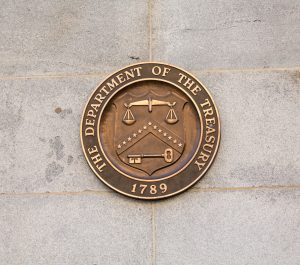The U.S. government has sanctioned 19 companies and individuals in Myanmar and Cambodia for their involvement in a multibillion-dollar global scam industry that it accused of stealing “billions of dollars from Americans using forced labor and violence.”
In a statement yesterday, the U.S. Treasury Department’s Department of Foreign Assets Control (OFAC) announced it had issued financial and diplomatic sanctions on nine targets operating in Shwe Kokko, a notorious scam hub in southeastern Myanmar, and a further 10 in Cambodia.
“Southeast Asia’s cyber scam industry not only threatens the well-being and financial security of Americans, but also subjects thousands of people to modern slavery,” Under Secretary of the Treasury for Terrorism and Financial Intelligence John K. Hurley said in the statement. He added that Americans had lost more than $10 billion from scam operations based in Southeast Asia in 2024.
In a separate statement, Secretary of State Marco Rubio said that the sanctions would “protect Americans from the pervasive threat of online scam operations by disrupting the ability of criminal networks to perpetuate industrial-scale fraud, forced labor, physical and sexual abuse, and theft of Americans’ hard-earned savings.”
The sanctions are the latest American response to the wave of digital criminality that has washed across Southeast Asia since the COVID-19 pandemic, particularly in loosely regulated parts of Cambodia, Laos, and Myanmar. Coordinated predominantly by Chinese organized crime syndicates, among the most prominent and profitable of these operations are industrial-scale scamming operations, which run romance-investment and crypto scams on victims in every corner of the globe.
In addition to victimizing those on the receiving end of the scams, these operations have relied on a large indentured workforce – mostly ordinary people who have been attracted by promises of employment, only to be kept imprisoned and forced to operate various types of digital scams, often on pain of beatings, mistreatment, and torture.
In 2023, the Office of the U.N. High Commissioner for Human Rights cited “credible sources” to the effect that at least 120,000 people in Myanmar and at least 100,000 in Cambodia “may be held in situations where they are forced to carry out online scams.”
Nine of the individuals and entities named by OFAC yesterday were connected to Shwe Kokko, a region of Myanmar’s Karen State that has become “a notorious hub for virtual currency investment scams” under the control of the rebel Karen National Army (KNA). Back in May, OFAC sanctioned the KNA (formerly the Karen Border Guard Force), along with the group’s leader Col. Saw Chit Thu, and his two sons, Saw Htoo Eh Moo and Saw Chit Chit, “for their role in facilitating cyber scams that harm U.S. citizens, human trafficking, and cross-border smuggling.”
Among those named yesterday were She Zhijiang, the creator of the city’s Yatai New City compound, and Tin Win and Saw Min Min Oo of the KNA, which OFAC alleged “provide security for those facilitating illicit money flows, and personally run entities that control and support scam compounds in Karen State.” The office also added six companies that it claims are part of the dense network of companies involved in the Shwe Kokko scam operations.
OFAC also sanctioned another four individuals and six companies linked to the extensive scamming operations that have taken deep root in Cambodia. Dong Lecheng and Xu Aimin were included for their role in turning a number of hotels, office blocks, and casinos in the coastal city of Sihanoukville into scam compounds. Chen Al Len and Su Liangsheng were included for involvement in fraud operations in Bavet, a town on Cambodia’s border with Vietnam.
OFAC also alleged that Su sits on the board of M D S Heng He Investment Co. Ltd., “the developer of a large virtual currency scam compound” in Cambodia’s Pursat province. M D S Heng He is chaired by Try Pheap, a Cambodian tycoon and close associate of former Prime Minister Hun Sen, who was sanctioned by the U.S. government in 2019 for his involvement in corruption, “including the misappropriation of state assets, the expropriation of private assets for personal gain, corruption related to government contracts or the extraction of natural resources, or bribery.”
M D S is one of several instances that researchers have referenced in support of claims that the online scamming industry has benefited from the protection of the Cambodian government and other member of the country’s political and economic elite.
In a report in June, the human rights group Amnesty International argued that Cambodia’s government was “complicit” in cybercrime. The report cited a “pattern of state failures” that allowed the cancerous industry to embed itself deeply in Cambodia, whose government appeared to be “deliberately ignoring” the abuses committed by crime syndicates. The Cambodian government has denied any involvement in scamming operations.
































